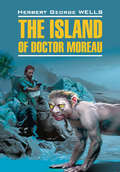
Герберт Джордж Уэллс
Anticipations
In cases where, instead of contiguous frontiers, the combatants are separated by the sea, the aerial struggle will probably be preceded or accompanied by a struggle for the command of the sea. Of this warfare there have been many forecasts. In this, as in all the warfare of the coming time, imaginative foresight, a perpetual alteration of tactics, a perpetual production of unanticipated devices, will count enormously. Other things being equal, victory will rest with the force mentally most active. What type of ship may chance to be prevalent when the great naval war comes is hard guessing, but I incline to think that the naval architects of the ablest peoples will concentrate more and more upon speed and upon range and penetration, and, above all, upon precision of fire. I seem to see a light type of ironclad, armoured thickly only over its engines and magazines, murderously equipped, and with a ram – as alert and deadly as a striking snake. In the battles of the open she will have little to fear from the slow fumbling treacheries of the submarine, she will take as little heed of the chance of a torpedo as a barefooted man in battle does of the chance of a fallen dagger in his path. Unless I know nothing of my own blood, the English and Americans will prefer to catch their enemies in ugly weather or at night, and then they will fight to ram. The struggle on the high seas between any two naval powers (except, perhaps, the English and American, who have both quite unparalleled opportunities for coaling) will not last more than a week or so. One or other force will be destroyed at sea, driven into its ports and blockaded there, or cut off from its supply of coal (or other force-generator), and hunted down to fight or surrender. An inferior fleet that tries to keep elusively at sea will always find a superior fleet between itself and coal, and will either have to fight at once or be shot into surrender as it lies helpless on the water. Some commerce-destroying enterprise on the part of the loser may go on, but I think the possibilities of that sort of thing are greatly exaggerated. The world grows smaller and smaller, the telegraph and telephone go everywhere, wireless telegraphy opens wider and wider possibilities to the imagination, and how the commerce-destroyer is to go on for long without being marked down, headed off, cut off from coal, and forced to fight or surrender, I do not see. The commerce-destroyer will have a very short run; it will have to be an exceptionally good and costly ship in the first place, it will be finally sunk or captured, and altogether I do not see how that sort of thing will pay when once the command of the sea is assured. A few weeks will carry the effective frontier of the stronger power up to the coast-line of the weaker, and permit of the secure resumption of the over-sea trade of the former. And then will open a second phase of naval warfare, in which the submarine may play a larger part.
I must confess that my imagination, in spite even of spurring, refuses to see any sort of submarine doing anything but suffocate its crew and founder at sea. It must involve physical inconvenience of the most demoralizing sort simply to be in one for any length of time. A first-rate man who has been breathing carbonic acid and oil vapour under a pressure of four atmospheres becomes presently a second-rate man. Imagine yourself in a submarine that has ventured a few miles out of port, imagine that you have headache and nausea, and that some ship of the Cobra type is flashing itself and its search-lights about whenever you come up to the surface, and promptly tearing down on your descending bubbles with a ram, trailing perhaps a tail of grapples or a net as well. Even if you get their boat, these nicely aerated men you are fighting know they have a four to one chance of living; while for your submarine to be "got" is certain death. You may, of course, throw out a torpedo or so, with as much chance of hitting vitally as you would have if you were blindfolded, turned round three times, and told to fire revolver-shots at a charging elephant. The possibility of sweeping for a submarine with a seine would be vividly present in the minds of a submarine crew. If you are near shore you will probably be near rocks – an unpleasant complication in a hurried dive. There would, probably, very soon be boats out too, seeking with a machine-gun or pompom for a chance at your occasionally emergent conning-tower. In no way can a submarine be more than purblind, it will be, in fact, practically blind. Given a derelict ironclad on a still night within sight of land, a carefully handled submarine might succeed in groping its way to it and destroying it; but then it would be much better to attack such a vessel and capture it boldly with a few desperate men on a tug. At the utmost the submarine will be used in narrow waters, in rivers, or to fluster or destroy ships in harbour or with poor-spirited crews – that is to say, it will simply be an added power in the hands of the nation that is predominant at sea. And, even then, it can be merely destructive, while a sane and high-spirited fighter will always be dissatisfied if, with an indisputable superiority of force, he fails to take.42
No; the naval warfare of the future is for light, swift ships, almost recklessly not defensive and with splendid guns and gunners. They will hit hard and ram, and warfare which is taking to cover on land will abandon it at sea. And the captain, and the engineer, and the gunner will have to be all of the same sort of men: capable, headlong men, with brains and no ascertainable social position. They will differ from the officers of the British Navy in the fact that the whole male sex of the nation will have been ransacked to get them. The incredible stupidity that closes all but a menial position in the British Navy to the sons of those who cannot afford to pay a hundred a year for them for some years, necessarily brings the individual quality of the British naval officer below the highest possible, quite apart from the deficiencies that must exist on account of the badness of secondary education in England. The British naval officer and engineer are not made the best of, good as they are, indisputably they might be infinitely better both in quality and training. The smaller German navy, probably, has an ampler pick of men relatively, is far better educated, less confident, and more strenuous. But the abstract navy I am here writing of will be superior to either of these, and like the American, in the absence of any distinction between officers and engineers. The officer will be an engineer.
The military advantages of the command of the sea will probably be greater in the future than they have been in the past. A fleet with aerial supports would be able to descend upon any portion of the adversary's coast it chose, and to dominate the country inland for several miles with its gun-fire. All the enemy's sea-coast towns would be at its mercy. It would be able to effect landing and send raids of cyclist-marksmen inland, whenever a weak point was discovered. Landings will be enormously easier than they have ever been before. Once a wedge of marksmen has been driven inland they would have all the military advantages of the defence when it came to eject them. They might, for example, encircle and block some fortified post, and force costly and disastrous attempts to relieve it. The defensive country would stand at bay, tethered against any effective counter-blow, keeping guns, supplies, and men in perpetual and distressing movement to and fro along its sea-frontiers. Its soldiers would get uncertain rest, irregular feeding, unhealthy conditions of all sorts in hastily made camps. The attacking fleet would divide and re-unite, break up and vanish, amazingly reappear. The longer the defender's coast the more wretched his lot. Never before in the world's history was the command of the sea worth what it is now. But the command of the sea is, after all, like military predominance on land, to be insured only by superiority of equipment in the hands of a certain type of man, a type of man that it becomes more and more impossible to improvise, that a country must live for through many years, and that no country on earth at present can be said to be doing its best possible to make.
All this elaboration of warfare lengthens the scale between theoretical efficiency and absolute unpreparedness. There was a time when any tribe that had men and spears was ready for war, and any tribe that had some cunning or emotion at command might hope to discount any little disparity in numbers between itself and its neighbour. Luck and stubbornness and the incalculable counted for much; it was half the battle not to know you were beaten, and it is so still. Even to-day, a great nation, it seems, may still make its army the plaything of its gentlefolk, abandon important military appointments to feminine intrigue, and trust cheerfully to the homesickness and essential modesty of its influential people, and the simpler patriotism of its colonial dependencies when it comes at last to the bloody and wearisome business of "muddling through." But these days of the happy-go-lucky optimist are near their end. War is being drawn into the field of the exact sciences. Every additional weapon, every new complication of the art of war, intensifies the need of deliberate preparation, and darkens the outlook of a nation of amateurs. Warfare in the future, on sea or land alike, will be much more one-sided than it has ever been in the past, much more of a foregone conclusion. Save for national lunacy, it will be brought about by the side that will win, and because that side knows that it will win. More and more it will have the quality of surprise, of pitiless revelation. Instead of the seesaw, the bickering interchange of battles of the old time, will come swiftly and amazingly blow, and blow, and blow, no pause, no time for recovery, disasters cumulative and irreparable.
The fight will never be in practice between equal sides, never be that theoretical deadlock we have sketched, but a fight between the more efficient and the less efficient, between the more inventive and the more traditional. While the victors, disciplined and grimly intent, full of the sombre yet glorious delight of a grave thing well done, will, without shouting or confusion, be fighting like one great national body, the losers will be taking that pitiless exposure of helplessness in such a manner as their natural culture and character may determine. War for the losing side will be an unspeakable pitiable business. There will be first of all the coming of the war, the wave of excitement, the belligerent shouting of the unemployed inefficients, the flag-waving, the secret doubts, the eagerness for hopeful news, the impatience of the warning voice. I seem to see, almost as if he were symbolic, the grey old general – the general who learnt his art of war away in the vanished nineteenth century, the altogether too elderly general with his epaulettes and decorations, his uniform that has still its historical value, his spurs and his sword – riding along on his obsolete horse, by the side of his doomed column. Above all things he is a gentleman. And the column looks at him lovingly with its countless boys' faces, and the boys' eyes are infinitely trustful, for he has won battles in the old time. They will believe in him to the end. They have been brought up in their schools to believe in him and his class, their mothers have mingled respect for the gentlefolk with the simple doctrines of their faith, their first lesson on entering the army was the salute. The "smart" helmets His Majesty, or some such unqualified person, chose for them, lie hotly on their young brows, and over their shoulders slope their obsolete, carelessly-sighted guns. Tramp, tramp, they march, doing what they have been told to do, incapable of doing anything they have not been told to do, trustful and pitiful, marching to wounds and disease, hunger, hardship, and death. They know nothing of what they are going to meet, nothing of what they will have to do; Religion and the Ratepayer and the Rights of the Parent working through the instrumentality of the Best Club in the World have kept their souls and minds, if not untainted, at least only harmlessly veneered, with the thinnest sham of training or knowledge. Tramp, tramp, they go, boys who will never be men, rejoicing patriotically in the nation that has thus sent them forth, badly armed, badly clothed, badly led, to be killed in some avoidable quarrel by men unseen. And beside them, an absolute stranger to them, a stranger even in habits of speech and thought, and at any rate to be shot with them fairly and squarely, marches the subaltern – the son of the school-burking, shareholding class – a slightly taller sort of boy, as ill-taught as they are in all that concerns the realities of life, ignorant of how to get food, how to get water, how to keep fever down and strength up, ignorant of his practical equality with the men beside him, carefully trained under a clerical headmaster to use a crib, play cricket rather nicely, look all right whatever happens, believe in his gentility, and avoid talking "shop."… The major you see is a man of the world, and very pleasantly meets the grey general's eye. He is, one may remark by the way, something of an army reformer, without offence, of course, to the Court people or the Government people. His prospects – if only he were not going to be shot – are brilliant enough. He has written quite cleverly on the question of Recruiting, and advocated as much as twopence more a day and billiard rooms under the chaplain's control; he has invented a military bicycle with a wheel of solid iron that can be used as a shield; and a war correspondent and, indeed, any one who writes even the most casual and irresponsible article on military questions is a person worth his cultivating. He is the very life and soul of army reform, as it is known to the governments of the grey – that is to say, army reform without a single step towards a social revolution…
So the gentlemanly old general – the polished drover to the shambles – rides, and his doomed column march by, in this vision that haunts my mind.
I cannot foresee what such a force will even attempt to do, against modern weapons. Nothing can happen but the needless and most wasteful and pitiful killing of these poor lads, who make up the infantry battalions, the main mass of all the European armies of to-day, whenever they come against a sanely-organized army. There is nowhere they can come in, there is nothing they can do. The scattered invisible marksmen with their supporting guns will shatter their masses, pick them off individually, cover their line of retreat and force them into wholesale surrenders. It will be more like herding sheep than actual fighting. Yet the bitterest and cruellest things will have to happen, thousands and thousands of poor boys will be smashed in all sorts of dreadful ways and given over to every conceivable form of avoidable hardship and painful disease, before the obvious fact that war is no longer a business for half-trained lads in uniform, led by parson-bred sixth-form boys and men of pleasure and old men, but an exhaustive demand upon very carefully-educated adults for the most strenuous best that is in them, will get its practical recognition.43…
Well, in the ampler prospect even this haunting tragedy of innumerable avoidable deaths is but an incidental thing. They die, and their troubles are over. The larger fact after all is the inexorable tendency in things to make a soldier a skilled and educated man, and to link him, in sympathy and organization, with the engineer and the doctor, and all the continually developing mass of scientifically educated men that the advance of science and mechanism is producing. We are dealing with the inter-play of two world-wide forces, that work through distinctive and contrasted tendencies to a common end. We have the force of invention insistent upon a progress of the peace organization, which tends on the one hand to throw out great useless masses of people, the People of the Abyss, and on the other hand to develop a sort of adiposity of functionless wealthy, a speculative elephantiasis, and to promote the development of a new social order of efficients, only very painfully and slowly, amidst these growing and yet disintegrating masses. And on the other hand we have the warlike drift of such a social body, the inevitable intensification of international animosities in such a body, the absolute determination evident in the scheme of things to smash such a body, to smash it just as far as it is such a body, under the hammer of war, that must finally bring about rapidly and under pressure the same result as that to which the peaceful evolution slowly tends. While we are as yet only thinking of a physiological struggle, of complex reactions and slow absorptions, comes War with the surgeon's knife. War comes to simplify the issue and line out the thing with knife-like cuts.
The law that dominates the future is glaringly plain. A people must develop and consolidate its educated efficient classes or be beaten in war and give way upon all points where its interests conflict with the interests of more capable people. It must foster and accelerate that natural segregation, which has been discussed in the third and fourth chapters of these "Anticipations," or perish. The war of the coming time will really be won in schools and colleges and universities, wherever men write and read and talk together. The nation that produces in the near future the largest proportional development of educated and intelligent engineers and agriculturists, of doctors, schoolmasters, professional soldiers, and intellectually active people of all sorts; the nation that most resolutely picks over, educates, sterilizes, exports, or poisons its People of the Abyss; the nation that succeeds most subtly in checking gambling and the moral decay of women and homes that gambling inevitably entails; the nation that by wise interventions, death duties and the like, contrives to expropriate and extinguish incompetent rich families while leaving individual ambitions free; the nation, in a word, that turns the greatest proportion of its irresponsible adiposity into social muscle, will certainly be the nation that will be the most powerful in warfare as in peace, will certainly be the ascendant or dominant nation before the year 2000. In the long run no heroism and no accidents can alter that. No flag-waving, no patriotic leagues, no visiting of essentially petty imperial personages hither and thither, no smashing of the windows of outspoken people nor seizures of papers and books, will arrest the march of national defeat. And this issue is already so plain and simple, the alternatives are becoming so pitilessly clear, that even in the stupidest court and the stupidest constituencies, it must presently begin in some dim way to be felt. A time will come when so many people will see this issue clearly that it will gravely affect political and social life. The patriotic party – the particular gang, that is, of lawyers, brewers, landlords, and railway directors that wishes to be dominant – will be forced to become an efficient party in profession at least, will be forced to stimulate and organize that educational and social development that may at last even bring patriotism under control. The rulers of the grey, the democratic politician and the democratic monarch, will be obliged year by year by the very nature of things to promote the segregation of colours within the grey, to foster the power that will finally supersede democracy and monarchy altogether, the power of the scientifically educated, disciplined specialist, and that finally is the power of saints, the power of the thing that is provably right. It may be delayed, but it cannot be defeated; in the end it must arrive – if not to-day and among our people, then to-morrow and among another people, who will triumph in our overthrow. This is the lesson that must be learnt, that some tongue and kindred of the coming time must inevitably learn. But what tongue it will be, and what kindred that will first attain this new development, opens far more complex and far less certain issues than any we have hitherto considered.







